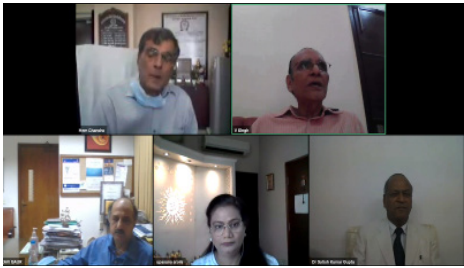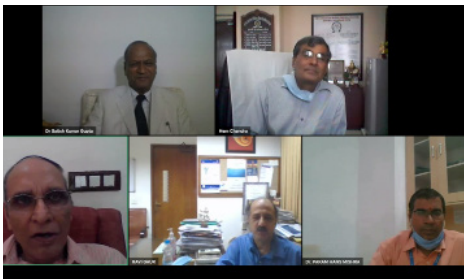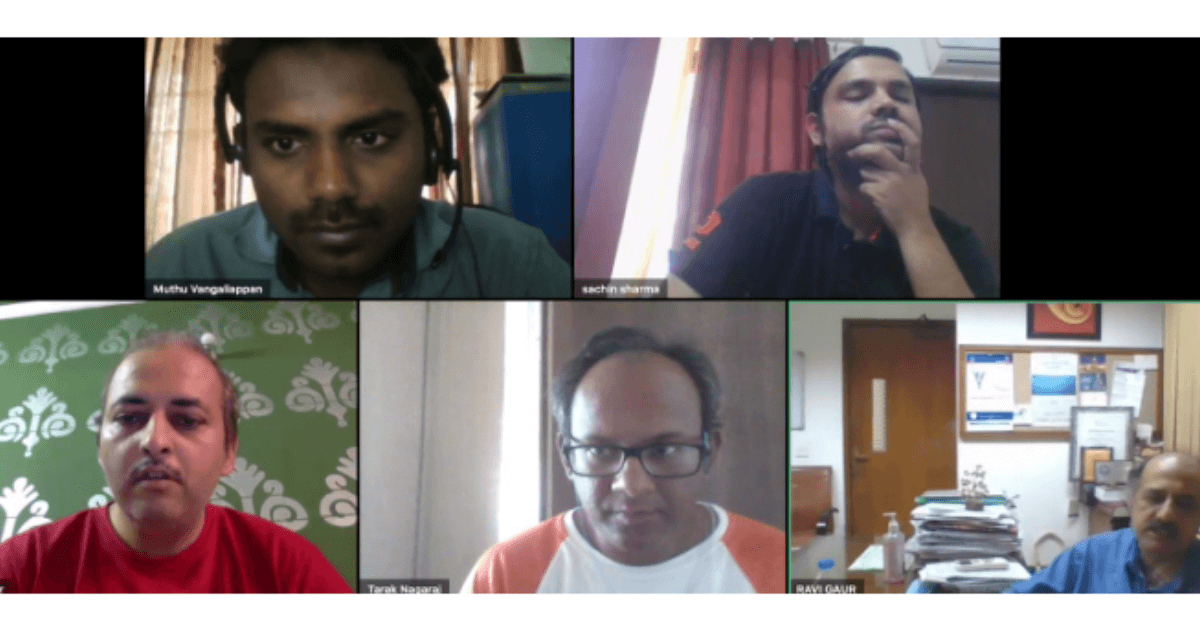
Perceiving the current unprecedented times, I vehemently make an audacious statement that COVID-19 pandemic is the most clamorous, catastrophic and redefining aeon of our lifetime. The situation that our generation has faced till date is more disastrous compared to the Spanish flu 1918. The rate of contraction of COVID-19 around the world has expedited from the first cases reported in China in the end of December 2019 till starting of the month May 2020 irrespective of the fact that an approximate of one-third of the world’s population is locked inside their homes.
The current unprecedented situation is bereft of following any norms and has perplexed the whole world regarding the economic crisis, lockdown protocols and strategies to come out safe from this virus. The virus has made alteration in its genetic expressions in order to acclimatize itself in diverse geographical regions of Earth. The virus has originated from cross-species transmission (CST), also called interspecies transmission is now an undeniable fact as per the scientific literature any ecological modifications made by microorganisms take nearly 800 years to carve a niche for itself. The spread of this virus is pernicious as it seems to find new ways to hide itself; and now that we can be asymptomatic and yet be a carrier of infection is really deadly and devastating.
The lockdown has given us the opportunity to refurbish our thought and adapt ourselves to accept the “new normal”. Amidst the current situations, healthcare sector faced the challenges pertaining to the novel corona virus or COVID-19 and to respite itself from this situation it was in dire need of sustainable innovations to cater to the ever increasing demands of the COVID-19 patients.
To address this situation, we as InnovatioCuris Foundation of Healthcare & Excellence (ICFHE) took the initiative to bring some industrial experts on a single platform to synergize the need of healthcare system and develop solutions towards it. As the world is being digitally collaborated in the present time, we organised a first of its kind virtual ICInnovatorCLUB meeting on May 2,2020.
After welcoming all the experts on board Dr V K Singh, MD of InnovatioCuris (IC), enlightened about the idea behind this virtual platform and the vital role played by IC to fight against the pandemic. Dr Hem Chandra Pandey, Vice chancellor of Uttarakhand Medical Education University initiated the opening of the session and shared his views regarding the public health issues addressed by the government hospitals prior to the pandemic to safeguard the health of the humans. Given the ordeal of the present situation the government and private hospitals have come together to deal with this situation where the public health activities are jointly being carried out by both.
Dr Hem Chandra also discussed the diversified role undertaken by the private hospitals in the state of Uttrakhand to collaborate with the state research institutes and government hospitals for better treatment to be imparted to COVID-19 patients.
Highlighting the issues of diagnostic challenges the COO of Oncquest Laboratories, Dr Ravi Gaur enlightened about the depth of the distressful situation with an impactful verdict that “the smallest, tiniest strand of RNA (virus) has brought the species humankind to its knees. But we humans have pulled through the crisis earlier, and will pull through this.”
He further emphasized that in the past, humans have faced two major infectious diseases i.e TB and HIV and the present scenario of COVID-19 also show higher impact on all the organs of the body therefore leading to a multiple organ failure in the human body. RT-PCR is the molecular diagnosis used for the detection. The serology and antibody assay using ELISA and rapid test cards play a vital role in epidemiological growth.
Some of the biggest challenges in testing/ diagnosing the current situation are:
- Identification of suspected cases and faster diagnosis
- Continuous revision of testing strategies
- Augmenting the testing capacity Limited
- Availability of infrastructure (like Biosafety Level 2 and 3 standards etc.)
- Limited NABL accredited diagnostic labs – Need to fast track accreditation
- Limited skilled workforce
- Safety of manpower
- Limited resources like PPEs – innovators stepped up and helped with some innovative models and was made available with the help of government interventions, but costs are high
- Type of sample for swab collection (nasopharyngeal / oropharyngeal / buccal)
- When to collect samples – time of sample collection (affects the accuracy of the diagnosis)
- Storage and transportation of the samples ( special Viral transport media required and cold chain needs to be maintained )
- Availability of ICMR approved testing kits
- Logistic and supply chain disruption
- Manpower needed for strong motivation and assurance
- Health being a state subject there is some communication gap in expressing the goals between the centre and the states quality validation
- Catering to India’s 1.3 billion population is a huge task and calls for a smoother operational mechanism for the success of this collaborative approach.
- State governments need to step up measures and ensure a hurdle-free procedure and a safe environment for the medical and testing workforce.
Appreciating the level of surveillance that countries like India are able to achieve at this time, Dr Gaur also highlighted the importance and appreciated the support, alertness being extended by the government towards the capacity building. The steps being taken to overcome many of these challenges ensure that the testing is available to the last man out there on the post with an affordable cost. Dr Gaur, added that COVID-19 virus has exposed the fragile existence of the human race. The accuracy of the detection and generation of test report in a short span of time (4-6 hours) will impart a major impact on the eradication of COVID-19
There is a strong need to have a near patient and rapid but very accurate test. As COVID-19, has become pandemic, there is an urgent need to invest more in developing state -of-art-laboratories equipped with latest technologies and qualified skilled force. Indian Government has done a very commendable work but to foster development a strong collaboration is needed between government managed labs and private labs. Both public and private entities have their limitations, but a combined effort can and will definitely make a huge difference.
According to Dr Nagendra Swamy,(Principal Coordinator of Federation of Healthcare Associations, Karnataka) there are approximately 16,00,000 beds in India out of which 8,00,000 are with the public health sector including government hospitals, armed forces etc. Another 8,00,000 are organised with private sector, the corporate hospitals have 62,000 published beds only and 1,00,000 beds available with large and tertiary care hospitals and moving to private medical colleges we have around 2,00,000 beds in this segment. The balance 4,00,000 beds in private healthcare that is virtually handling the common class and serving as the backbone of the Indian healthcare. He further emphasised the unimportance given to the small and medium sized hospitals that can play a major role in safeguarding the health of humungous population of India in the current pandemic interventions.
Since the better healthcare facilities are only available in the metropolitan cities there is an immediate surge for upliftment needed for the small and medium sized healthcare centres as this will cater to the sustainable source for tackling the unprecedented situations caused by pandemic and the epidemics.
He further complemented the efforts and guidelines rolled out by MOHFW and ICMR to segregate the hospitals into COVID and non-COVID hospitals so that all the other healthcare facilities are also available to the patients without any risks of cross contamination with coronavirus. Dr Swamy, also shared his concern about the financial and disease burden challenges that such hospitals are facing today, and highlighted the role of small and mid-sized hospitals to fight the difficult situation by serving people with non-covid health issues keeping in mind the safety of all.

In alignment of the aforementioned thoughts and further highlighting the challenges being faced by any mid-sized hospitals today, Ms Upasana Arora,the Director of Yashoda Hospital, Kaushambi and the chairperson of Services Export Promotion Council (SEPC) requested the industrial expert to make amendments in the policies for healthcare sector to combat the pandemic situations in a better way. She also emphasised on how all the safety measures like wearing masks, PPE etc should be considered as a universal precaution.
Moving ahead on the path of analysing the challenges that the healthcare industry is facing, Dr S K Gupta, Director of Cardiology & Medicine, JWM Global Hospital & Research Centre India, talked about one of the most important and least talked aspects to this dreadful situation that is trauma and anxiety that the health workers and people are facing today. Putting it together, Dr Gupta told that there are three dimensional aspects to one’s well being, that is Spirit, Body and Mind. Whether we talk about insomnia, strange dreams, or even too much sleep, all are types of sleep disturbances that are a part of our body’s response to trauma and anxiety.
“Healthy self” and “self awareness” are the key to good health that we all need to take care of. Mindfulness and relaxation techniques are proven to improve mood and sleep quality by enhancing the control over the body’s focus and arousal system as well as in managing anxiety and concerns.
Stress, in such a situation is quite normal and can be healthy (as it motivates one to take necessary actions), but too much sustained stress is not. High and unregulated levels of stress can have various negative consequences on the brain, immunity and also on the vascular system of the body, leading to blood sugar imbalances, high blood pressure, impaired immunity and inflammatory responses – the very precise opposite of what we need to fight the potential impact from this COVID-19 exposure.
Good sleep, healthy diet and meditation are important practices to be taken into consideration. Three dimensional healthy lifestyle can do wonders and everyone should try to follow it, irrespective of one being at home, in a hospital or anywhere else. Another interesting picture of challenges being faced by the private hospitals was emphasised by Dr Param Hans Mishra,CEO of Kailash hospital.
It is really sad that we all are struggling with such a paradoxical setting today, where doctors who are the front line protectors/fighters have their own protection at highest risks, the healthcare staff who are saving millions of lives and families have their own lives and families in the most vulnerable zone. And to top all this, is the shortage of resources and finances to serve these healthcare workers, organisations and ecosystems. It is a real challenge for the private sector as the reduction in the number of noncovid treatments/surgeries (due to fear of catching cross infection) leads to reduction in cash flow and high number of covid treatments demands more and more per patient inputs (financial as well as human resource).
Trying to find solutions to some of the above challenges, ICFHE under the umbrella of Ministry of Human Resource & Development (MHRD) organised two virtual national level hackathon on Fight Corona IDEAthon and MHRD Mega Online Challenge – SAMADHAN in the month of March and April, to call upon the young innovators.
Fight Corona IDEAthon was organised from March 27-29, 2020 by ICFHE under the aegis of the Ministry of Human Resource Development Innovation Cell, All India Council for Technical Education (AICTE) and FORGE Accelerator. It was a national level 48 hour virtual/online ideation hackathon that extended to 72 hours due to overwhelming response, to discover ideas from thousands of innovators, researchers, scientists, and educators from across India. More than 5400 teams and 300 mentors joined hands as a true community during these uncertain and challenging times to discover solutions that can help the nation rise and combat COVID-19.
There were nine IDEAthon winners, three in each track of Students, Educators & Researchers and Professionals & Startups. The winners were awarded the cash prizes and also incubation grants upto 40 lakhs. There were also nine motivational cash prizes (three in each category) given out to motivate some of the best ideas from around the country.
Standing tall on a highly impactful Fight Corona IDEAthon, the Ministry of Human Resources & Development, in collaboration with AICTE and InnovatioCuris Foundation of Healthcare & Excellence (ICFHE), again hosted a nation-wide mega online challenge SAMADHAN under two tracks- Track 1:Ideate-Simulate-Win and Track 2: Validate-Pitch-Deploy.Under the SAMADHAN challenge there were three categories namely: student innovators, researchers & educators and startups to share their ideas to solve the challenges posed by COVID-19 pandemic.
The SAMADHAN challenge was a 14 days long hackathon from April 14-25, 2020, that witnessed more than 3200 team participation from all over India. With the initiative of these hackathons, our healthcare ecosystem got some bright solutions catering to some of the challenges posed by this pandemic. Through an interactive discussion, Mr.Tarak Nagarajan from Abhaytech,
Mr. Muthu Vangaliappan from Katomaran Technologies and Business Solutions and Dr Sachin Sharma from AI joined and shared their personal experiences and innovative solutions that they have developed to fight the crisis.
Working on their innovative solutions like:
1) disposable/ reusable lung and heart monitors that can be worn at home and only require a smartphone which will help to reduce the burden for hospital based monitoring and the bottleneck of available hospital beds. As most of the death are occurring due to comorbidity. The AI Algorithm developed by Abhayatech can act as a temporary doctor and constantly help in monitoring the patients therefore ease the burden on doctors.
2) Autonomous mobile UV-C robot. It’s a AI-enabled robot that can be used to sanitize hospitals, offices, campuses etc. It could be useful in hospital settings where the room has to be sanitized after each and every patient like MRI room or CT scan room etc.
3) Early detection of COVID-19 using CT scan images and machine learning techniques.
We hope that our Indian healthcare ecosystem will soon be able to implement such innovative solutions to cater some of the challenges mentioned by the experts and also there will be more and more young innovators out there who are eager to help the community in this time of crisis.
Trying to fast forward this implementation process, ICFHE has taken a step towards creating a Hospital Innovation Screening Committee (HSIC) to get the innovations evaluated and tested on ground to expedite the validation process. A platform was extended to the innovators to demonstrate their inventions that is evaluated by the eminent leaders of the industry.
As it’s said, every crisis is an opportunity in disguise. So let’s try to grab this opportunity and stand together to fight against this and any such pandemic in future.
Composed by: Parthvee Jain

